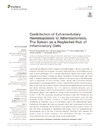Please use this identifier to cite or link to this item:
https://accedacris.ulpgc.es/jspui/handle/10553/75555
| Title: | Contribution of Extramedullary Hematopoiesis to Atherosclerosis. The Spleen as a Neglected Hub of Inflammatory Cells | Authors: | Fernández-García, Victoria González-Ramos, Silvia Martín-Sanz, Paloma Castrillo, Antonio Boscá, Lisardo |
UNESCO Clasification: | 320702 Artereoesclerosis 320704 Patología cardiovascular 320602 Metabolismo energético |
Keywords: | Atherogenesis Extramedullar Manifestations Hematopoiesis Inflammation Spleen |
Issue Date: | 2020 | Journal: | Frontiers In Immunology | Abstract: | Cardiovascular diseases (CVDs) incidence is becoming higher. This fact is promoted by metabolic disorders such as obesity, and aging. Atherosclerosis is the underlying cause of most of these pathologies. It is a chronic inflammatory disease that begins with the progressive accumulation of lipids and fibrotic materials in the blood-vessel wall, which leads to massive leukocyte recruitment. Rupture of the fibrous cap of the atherogenic cusps is responsible for tissue ischemic events, among them myocardial infarction. Extramedullary hematopoiesis (EMH), or blood cell production outside the bone marrow (BM), occurs when the normal production of these cells is impaired (chronic hematological and genetic disorders, leukemia, etc.) or is altered by metabolic disorders, such as hypercholesterolemia, or after myocardial infarction. Recent studies indicate that the main EMH tissues (spleen, liver, adipose and lymph nodes) complement the hematopoietic function of the BM, producing circulating inflammatory cells that infiltrate into the atheroma. Indeed, the spleen, which is a secondary lymphopoietic organ with high metabolic activity, contains a reservoir of myeloid progenitors and monocytes, constituting an important source of inflammatory cells to the atherosclerotic lesion. Furthermore, the spleen also plays an important role in lipid homeostasis and immune-cell selection. Interestingly, clinical evidence from splenectomized subjects shows that they are more susceptible to developing pathologies, such as dyslipidemia and atherosclerosis due to the loss of immune selection. Although CVDs represent the leading cause of death worldwide, the mechanisms involving the spleen-atherosclerosis-heart axis cross-talk remain poorly characterized. | URI: | https://accedacris.ulpgc.es/handle/10553/75555 | DOI: | 10.3389/fimmu.2020.586527 | Source: | Frontiers in Immunology [EISSN 1664-3224], v. 11, 586527, (Octubre 2020) |
| Appears in Collections: | Reseña |
SCOPUSTM
Citations
32
checked on Jun 8, 2025
WEB OF SCIENCETM
Citations
35
checked on Jan 25, 2026
Page view(s)
48
checked on Jan 10, 2026
Download(s)
58
checked on Jan 10, 2026
Google ScholarTM
Check
Altmetric
Share
Export metadata
Items in accedaCRIS are protected by copyright, with all rights reserved, unless otherwise indicated.
